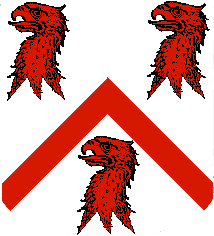|
Casey, (O) Casey, (Mac Cathasaigh)
 Per Varios Casos (By Various Fortunes) Per Varios Casos (By Various Fortunes)
Casey, O'Casey and MacCasey come from the Irish cathasach meaning vigilant in war, a personal name which is quite common in early Ireland. This no doubt accounts for the fact that O'Cathasaigh arose as a separate surname in at least five distinct areas in countries Cork, Dublin, Fermanagh, Limerick and Mayo with Mac Cathasaigh confined to the Louth/Monaghan area. In Medieval times the Dublin and Fermanagh Caseys were the greatest and most prominent though their power like that of other families had been broken by the seventeenth century. The name is still common in Connacht generally in the Roscommon area. However, most present day bearers of the surname are to be found in Munster and not only Cork and Limerick but also in Kerry and Tipperary.
Casey Name History
Almost every Irish name reflects it’s ancient Gaelic heritage, the Casey name is no exception. The Casey family name traces its descent from the ancient kings of Ireland. At one time the people of Ireland were known only by a single Gaelic name. However, they were forced to assume surnames to distinguish themselves as the population grew and they began to encounter others with the same name. This happened earlier in Ireland than in most other European countries, and surnames were common by the 11th century. Surnames were adopted according to very general principles, and the manner in which Casey became a hereditary surname referring to a particular Irish sept is interesting. Although the most common early surnames in Ireland were patronymic names, formed by adding the prefix “Mac”, gaelic meaning ‘son of’, to the name of the father, or the prefix ‘O’, meaning grandson of, to that of a grandfather or earlier male ancestor, these prefixes were also sometimes added to a word denoting the physical characteristics or attributes of the father or grandfather, thus becoming a nickname surname. As nickname surnames became more common, the addition of the prefix became less necessary, and the descriptive epithet was sometimes added directly to the personal name. As a consequence surnames without the distinctive Mac or O arose. The early gaelic form of the name Casey is O’ Cathasaigh, from the word cathasach, which means watchful.
Different spelling variations of the name Casey were found in archives, as outlined here:
|
Cayzer
|
O’Gallinah
|
MacAsey
|
O’Caseys
|
|
O’ Casey
|
O’Cazey
|
O’Cazzey
|
O’Cazzie
|
|
O’Cazzies
|
Cassys
|
O’Galinah
|
Cassyes
|
|
Cazeys
|
Cazzey
|
Cahasey
|
Cazzeys
|
|
Cazzie
|
Cazzies
|
O’Gallinagh
|
|
|
The earliest records of the name Casey were found in the counties of Fermanagh, Mayo, Dublin, Limerick, Cork and Rocommon. In early times, there were six unrelated septs of O’Castasaigh; the two most important were the erenagh (church steward) families of Devenish in county Fermanagh, and the lords of the Suaithni, in the present-day barony of Balrothery West, in County Dublin. The name has since become widely scattered, although it remains common in the county of Dublin. It is now most prevalent in south-west Munster, with a smaller but still sizable population in north Connacht. This corresponds with the locations of the other four septs, which were found in Liscannon near Bruff in county Limerick; Mitchelstown in county Cork; Clondara in county Roscommon; and in Tirawley in county Mayo, where two Casey septs were located. The Casey of Mayo and Roscommon, like those in Fermanagh, were notable as erenaghs. Archaeological remains tell us that Caseys were also found near Waterford, also in Munster. Furthermore MacCasey was once located at Oriel and was common in county Monaghan. Due to the widespread dropping of Irish prefixes under British rule and their often-erroneous resumption in the 20th century, many MacCaseys are incorrectly thought to be O’Caseys.
|

